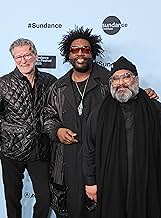Sly Lives! (aka the Burden of Black Genius)
- 2025
- 1h 52min
VALUTAZIONE IMDb
7,6/10
1299
LA TUA VALUTAZIONE
Si concentra sulla vita e l'eredità di Sly and the Family Stone, raccontando la storia dietro l'ascesa, il regno e la scomparsa di uno degli artisti più influenti della musica pop.Si concentra sulla vita e l'eredità di Sly and the Family Stone, raccontando la storia dietro l'ascesa, il regno e la scomparsa di uno degli artisti più influenti della musica pop.Si concentra sulla vita e l'eredità di Sly and the Family Stone, raccontando la storia dietro l'ascesa, il regno e la scomparsa di uno degli artisti più influenti della musica pop.
- Candidato a 1 Primetime Emmy
- 4 candidature totali
Sly Stone
- Self - Singer, Sly & The Family Stone
- (filmato d'archivio)
Cynthia Robinson
- Self - Trumpet, Sly & The Family Stone
- (filmato d'archivio)
Recensioni in evidenza
This fascinating look into the musical career of Sly Stone. The genius gets overused, but it should be applied to Stone, a DJ, arranger, producer, songwriter, and performer. His Family Stone is one of the few projects that was wildly inventive and insanely catchy. And the reification of a specific social ideal of unity that transcended pablum. Yet, the pressure of success, the increasing availability of drugs, and the special burden placed on Black artists (too successful - you're not legit, not successful enough - you out) led to Sly becoming a parody of himself. While the film doesn't shy away from the downside, there is more disturbing material that could have been included. Those stories have been told, and it is time to focus on a particular moment in music history that was defined by Sly.
Sly stone was a genius, a tremendous success from 1968-1972, and a pioneer of multiracial rock funk & pop.
His greatest hits lp is beyond great.
Unfortunately his career was derailed by drugs booze and not showing up for live gigs, destroying the band and ultimately Sly himself. Ironically, sly worked very hard for ten years to attain his success by showing up on time and being there. His unraveling remains one of the mercurial questions of rock history.
That he was an all time great, there is little question. Sly and the Family Stone were inducted into the rock n roll HOF in 1993.
Sly is still living. He should be touring like Dylan, but he chooses not to. He remains an enigma within a riddle.
His greatest hits lp is beyond great.
Unfortunately his career was derailed by drugs booze and not showing up for live gigs, destroying the band and ultimately Sly himself. Ironically, sly worked very hard for ten years to attain his success by showing up on time and being there. His unraveling remains one of the mercurial questions of rock history.
That he was an all time great, there is little question. Sly and the Family Stone were inducted into the rock n roll HOF in 1993.
Sly is still living. He should be touring like Dylan, but he chooses not to. He remains an enigma within a riddle.
This is fine and will do the job as placeholder. It's in the standard format of blending clips, stills, archive footage, with contamporaries being interviewed, to take us through a famous life, the ups and downs and perhaps lessons involved.
Here it's Sly Stone, who oould have been a Prince of sorts. Theatric, multifaceted, but it was the civil rights years, and his creative life mirrors that trajectory; ebullient hope to transcend boundaries, to bitterly dashed dreams.
One lesson, and it's generally offered, is that there was no scaffold, blueprint, on which to know what to do build next, how to play the role of superstar. He, along with everybody else, had to make it up as they went along. Another talking point here is 'black' genius, the particular tolls of it in a world where boundaries are drawn starkly against you.
There may be parallels with someone like Brian Wilson; 'genius' in being able to perceive music as visual world, as shared streets you explore, but limited in the means, work, and focused commitment required to consistently bring it to life.
At least his Riot album is as important as anything from the time, a dissonant extended improvisation on previous fabric of soul music, and that as mirroring a dissonant collapsing America. It's probably a cornerstone for all black music that followed.
My own takeaway is of a man who in terms of vision was second to none of the greats of the era; adept at improvising self, savvy enough to be able to see the larger fabric.
But there's no real stage for him to move to, fails to transcend, and probably had plenty of reasons against him. The drugs were probably ways to dissociate, make believe he was what he couldn't summon. So he periodically returns as caricature of himself, clowning it for the camera, unsure how to be the next version of himself.
Meanwhile, just as he was cratering, Bronx and Harlem youths were rediscovering him in record stores, and were about to speak once more about what he used to; the world of stark limits, and yet somehow joyful dance, ironically cruising through cracks. Interestingly, the new music, hip hop, would eschew the whole band format, and pare it down to narrator and rousing, sometimes soulful breaks that suggest world.
Here it's Sly Stone, who oould have been a Prince of sorts. Theatric, multifaceted, but it was the civil rights years, and his creative life mirrors that trajectory; ebullient hope to transcend boundaries, to bitterly dashed dreams.
One lesson, and it's generally offered, is that there was no scaffold, blueprint, on which to know what to do build next, how to play the role of superstar. He, along with everybody else, had to make it up as they went along. Another talking point here is 'black' genius, the particular tolls of it in a world where boundaries are drawn starkly against you.
There may be parallels with someone like Brian Wilson; 'genius' in being able to perceive music as visual world, as shared streets you explore, but limited in the means, work, and focused commitment required to consistently bring it to life.
At least his Riot album is as important as anything from the time, a dissonant extended improvisation on previous fabric of soul music, and that as mirroring a dissonant collapsing America. It's probably a cornerstone for all black music that followed.
My own takeaway is of a man who in terms of vision was second to none of the greats of the era; adept at improvising self, savvy enough to be able to see the larger fabric.
But there's no real stage for him to move to, fails to transcend, and probably had plenty of reasons against him. The drugs were probably ways to dissociate, make believe he was what he couldn't summon. So he periodically returns as caricature of himself, clowning it for the camera, unsure how to be the next version of himself.
Meanwhile, just as he was cratering, Bronx and Harlem youths were rediscovering him in record stores, and were about to speak once more about what he used to; the world of stark limits, and yet somehow joyful dance, ironically cruising through cracks. Interestingly, the new music, hip hop, would eschew the whole band format, and pare it down to narrator and rousing, sometimes soulful breaks that suggest world.
A current documentary airing on Hulu from Oscar winner Questlove. Following the rise & eventual fall of Sylvester Stewart (Sly) & his band, we get a hallucinatory ascent of a mixed raced band who wowed audiences at Woodstock w/their mixture of rock & R & B which carried over to their many appearances on television at the time. Of course, one's demons reared its ugly head for Sly as his upward success came hand in hand w/his increasing drug use which by the time the late 70's rolled around the band were soon relegated to the past their prime heap but w/Questlove's expertise w/archival footage & interviews as well as modern takes on the band's output & influence from current songsmiths (Andre 3000 from Outkast, D'Angelo, Q-tip from A Tribe Called Quest) who put Sly & the Family Stone's music into righteous perspective.
Sly Stone is an infinitely fascinating character and musician. His music will be around forever.
Qwestlove's obsession with Sly being a black genius is grating and he's projecting too much of his own outlooks instead of trying to find out and express just what Sly Stone's outlook was/is.
Most of the musicians interviewed in the doc, do not hold a candle to Sly's talent or achievements, so their opinions don't hold much weight.
The only interviews that were interesting were his band mates. And how could they not a find any of his contemporaries? How could they basically ignored his discography after Fresh? Or the quirky side projects he did.
This documentary had too much of a personal agenda that wasn't about Sly Stone. Still, the man was just that interesting that he shines through despite the negative issues.
Qwestlove's obsession with Sly being a black genius is grating and he's projecting too much of his own outlooks instead of trying to find out and express just what Sly Stone's outlook was/is.
Most of the musicians interviewed in the doc, do not hold a candle to Sly's talent or achievements, so their opinions don't hold much weight.
The only interviews that were interesting were his band mates. And how could they not a find any of his contemporaries? How could they basically ignored his discography after Fresh? Or the quirky side projects he did.
This documentary had too much of a personal agenda that wasn't about Sly Stone. Still, the man was just that interesting that he shines through despite the negative issues.
Lo sapevi?
I più visti
Accedi per valutare e creare un elenco di titoli salvati per ottenere consigli personalizzati
Dettagli
- Data di uscita
- Paese di origine
- Lingua
- Celebre anche come
- Sly Lives! El legado de un genio
- Aziende produttrici
- Vedi altri crediti dell’azienda su IMDbPro
- Tempo di esecuzione
- 1h 52min(112 min)
- Colore
- Mix di suoni
Contribuisci a questa pagina
Suggerisci una modifica o aggiungi i contenuti mancanti





































